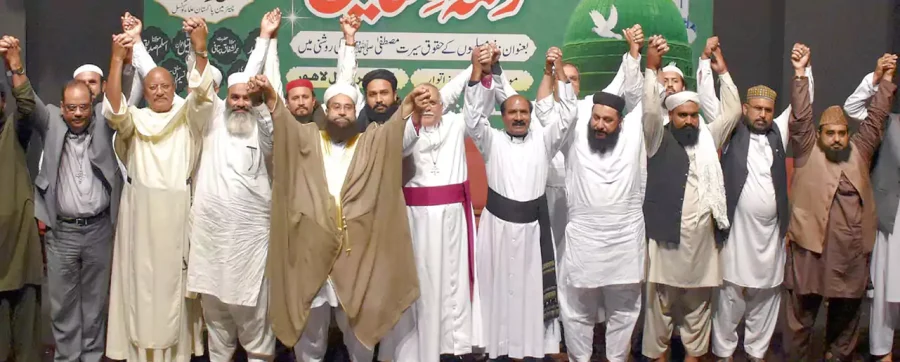The leaders from diverse religious backgrounds and schools of thought on Sunday convened at the Seerat Rahmatul-lil-Alameen Conference and denounced the pervasive threats of terrorism and extremism plaguing Pakistan.
The conference, organized by the Pakistan Ulema Council here at the Al Hamra Hall, was attended by over 500 scholars, religious leaders, political figures, and representatives from all walks of life in a powerful display of unity. The event was chaired by PUC Chairman and International Interfaith Harmony Council President, Hafiz Muhammad Tahir Mahmood Ashrafi.
They particularly highlighted the tragic events in Mastung and Hangu on Friday, 12th Rabiul Awwal, and expressed their unified stance that terrorists aimed to sow chaos and harm innocent lives. They alleged that these criminal networks received support from anti-Pakistan forces and India. The religious and political leaders pledged unwavering support to Pakistan in its fight against terrorism, extremism, and sectarian violence. They emphasized the need to thwart inter-religious conflicts and plots of violence and offered their full cooperation in achieving these goals.
Addressing a critical issue within Pakistan, the leaders stressed the importance of referring to non-Muslim Pakistanis as such, rather than using the term minority. They underscored the states responsibility to safeguard the lives, property, dignity, and honor of non-Muslim citizens and their places of worship.
To ensure regional stability and peace, the leaders called for strengthened relations between the Afghan interim government and Pakistan. They emphasized that both countries should collaborate to eradicate terrorism and prevent its resurgence. They firmly believed that peace in Afghanistan was intertwined with the peace of Pakistan. The leaders presented evidence of Indian involvement in acts of terrorism, not only in Pakistan but also in Canada and other countries.
They decried recent incidents as part of a conspiracy to revive the war on terror and called for unity in opposing such acts. The leaders emphasized that the Constitution of Pakistan protected the rights of followers of all religions and sects.
They called for using the term non-Muslim Pakistanis for non-Muslims and urged the government to resolve issues related to non-Muslim places of worship. They urged the government to sit down with the Qadiani group and decide the design with reference to their places of worship and register their places of worship like other religions.
The leaders announced plans for joint gatherings across the country against terrorism, extremism, and intolerance in Karachi, Quetta, Peshawar, and Islamabad during October. They declared suicide attacks, the killing of innocents, and armed struggle against the state as Haram (forbidden) and affirmed the states right to take an action against those involved.










